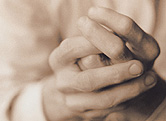
WEDNESDAY, Nov. 26, 2014 (HealthDay News) — People with rheumatoid arthritis may be more likely to achieve remission if they maintain a healthy body weight, according to new research.
The study found that those who were heaviest had almost 65 percent reduced odds of disease remission. Being underweight also lowered the odds of remission.
“Medication for rheumatoid arthritis is not as effective on the overweight population,” said Dr. Susan Goodman, the study’s lead author and a rheumatologist at the Hospital for Special Surgery in New York City.
Findings from the new research were presented earlier this month at the American College of Rheumatology annual meeting in Boston. Studies presented at meetings are generally considered preliminary until they’ve been published in a peer-reviewed journal.
It’s also important to note that while this study found a link between weight and rheumatoid arthritis remission, it wasn’t designed to show whether or not weight was actually responsible for changes in remission status.
Almost 1.5 million Americans have rheumatoid arthritis, a chronic condition that causes painful joint swelling that can lead to joint deformity, according to the Arthritis Foundation. The disease is three times more common in women, and typically begins between ages 30 and 60, the Arthritis Foundation reported.
A major goal of treatment is to induce remission — defined as no or low inflammation or no signs of active disease, according to the Arthritis Foundation.
Rheumatoid arthritis patients who achieve remission experience a significant reduction in symptoms, according to Goodman. Patients have achieved remission when they no longer have fatigue, swelling in their joints and short-lived morning joint stiffness, she noted. Patients are significantly more likely to attain these results if they adhere to a specific plan to combat the disease, Goodman said.
The current study followed nearly 1,000 patients — who developed the disease at an early age — for three years.
The researchers found that people who were underweight had 45 percent lower odds of achieving remission than people of normal weight. And, people who were obese (a body mass index — or BMI — of 35 to 40) or morbidly obese (a BMI over 40) had about 50 to 60 percent lower odds of achieving remission of their rheumatoid arthritis, according to the study. BMI is a measurement that roughly estimates how much body fat a person has.
“Obesity is a major barrier that stops people from responding to treatment,” said Daniel White, an assistant professor of physical therapy at the University of Delaware in Newark, Del., who reviewed the study’s findings.
The investigators also found that certain patients were more likely to achieve a sustained remission. These included people who don’t smoke, as well as those who start treatment with a drug known as methotrexate. The study also found that people who respond quickly to treatment often enter a sustained remission.
Goodman said the researchers were surprised to see that obesity appeared to play such a big role in whether or not someone went into remission. She suspects that inflammation associated with obesity may be the reason why.
The researchers aren’t sure why being underweight might affect whether or not a person is able to go into remission. Goodman said it’s possible that people who were underweight may have been more likely to be smokers or to have another illness that caused inflammation. She said she hopes to have a larger group of underweight people in a future study to be able to draw stronger conclusions about this group.
Whatever your weight, Goodman said physical activity is often helpful for people with rheumatoid arthritis. She said exercise can help prevent some of the joint swelling that comes with the disease.
White agreed that “there has been strong evidence for years that physical activity is beneficial for joint function.”
Soon after starting medication, Goodman counsels her patients to start a regular low-impact exercise regimen. Running and jogging can be painful for sore joints, but regular walking, cycling and swimming are very beneficial for rheumatoid arthritis patients, she said.
But, she added that physical activity is often extremely difficult for people who have just been diagnosed with the condition. Inflamed joints can be very painful, she noted.
More information
Learn more about rheumatoid arthritis from the American College of Rheumatology.
Copyright © 2026 HealthDay. All rights reserved.

